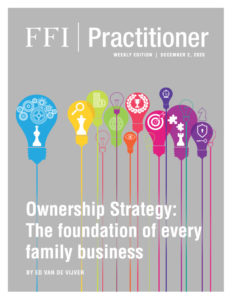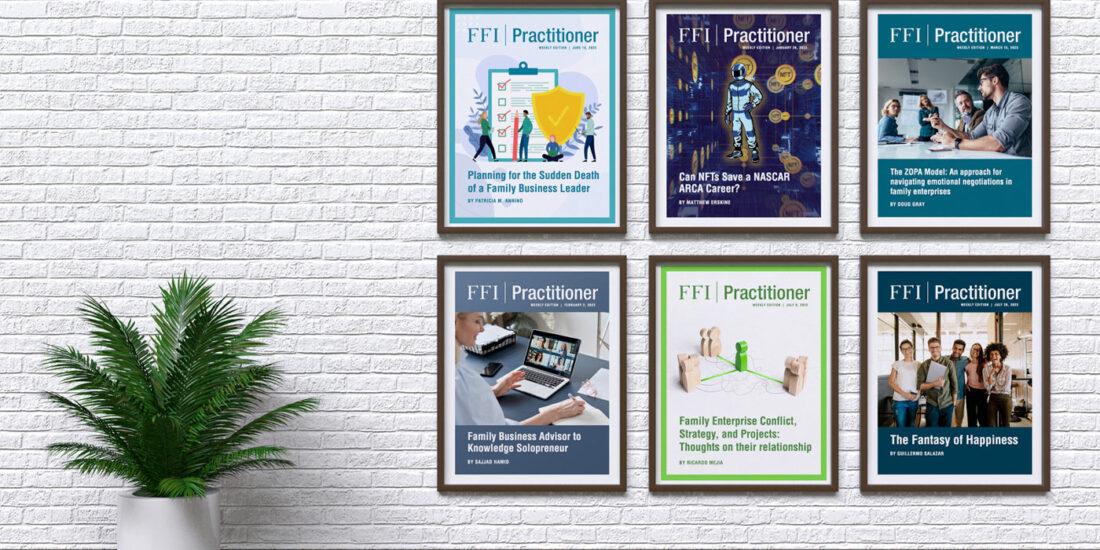
View this edition in our enhanced digital edition format with supporting visual insight and information.
Thank you to FFI Fellow Ed van de Vijver for this week’s article on the importance of developing a family enterprise ownership strategy that is aligned with the family financiers’ objectives. In this article, Ed explores the benefits of adopting a family ownership strategy and family charter that provide a platform for discussing this topic with family enterprise clients.
Motivation of the financier
Before going into the title of this article, let’s take a moment to reflect on something that corporate strategy often ignores. There is a link between financing the company’s working capital and making strategic choices. After all, strategic objectives cannot be achieved without the necessary capital. On the other hand, financiers take the risk that the results will be disappointing, or even that part of the investment will be lost. When financing companies, therefore, it is a question of balancing return against risk. In general, the risk increases if a higher return is sought. In order to achieve a high and rapid return, people are prepared to take large (or larger) risks. Investors who are looking for safe investments should be satisfied with a lower return. In the case of external financing of companies, these considerations and aspects are clearly stated and choices are made in a well-considered manner.
At the heart of these considerations, therefore, is the motivation of the financier. In principle, the above would apply to all companies, were it not for the fact that—unlike all other companies—family businesses are often financed by family capital. However, many business families are insufficiently aware of their own motivations as financiers of the business.
Risk-bearing or not?
In a survey conducted by BDO a few years ago, in which entrepreneurs/shareholders of family businesses were asked whether the family capital invested in the company was seen as risk-bearing, most people replied that this was not the case. Without going into the details: shares or depositary receipts in a private limited company are 100% risk-bearing. There is no guarantee of return and there are no securities in return. If the company experiences a downturn, the value of the shares is reduced, and in the event of bankruptcy, everything can be lost. You may wonder why survey respondents would perceive this investment so differently. This became somewhat clear when the follow-up question was asked: what if the family itself is not in the management of the company, and there is an external management? Prompted by this new question, most respondents revised their point of view – finding that there was risk-bearing capital. Of course, this says nothing about the quality of the management, but mainly about the perception of the business family in question.
The influence of the family on the process of making strategic choices in the company is essential for the perception and assessment of the risks for the most important objective of many family businesses: continuity. Apart from this, safeguarding and preserving family values in the company remains an important motive in the perspective of identity.
Taking these observations into account, it is striking that many family businesses lack a clear ownership strategy supported by the family.
Definition and meaning
Owner strategy in a family business consists of clearly articulated family objectives and, as the financier of the business, providing framework conditions and criteria for achieving those objectives. In other words: Why do we invest our family capital in the company and what conditions do we set as a family? An elaborate owner strategy, usually as part of a family charter, includes clear criteria with regard to expected return, risk management, dividend policy, and remuneration, supported by motives such as continuity, family objectives, and values. This provides an explicit framework for management as well as for family business advisors and a solid foundation for the business strategy. Particularly where family members have a financial interest in the company without working in the company and/or the management board themselves, a comprehensive and broadly supported owner strategy is a necessity.
Family in the lead
Because a family is not a financial institution but a system that is governed by loyalty, emotions, and often unconscious behavioral patterns, formulating clear objectives and principles about the company requires a careful approach. The vision and support of the family is the starting point: not about how the company should be run, but about the way in which the company is financed by the family. In this context, I am often asked the question: Why consider the whole family and not just the shareholders? The answer to this question lies hidden in the family dynamics, as well as in general inheritance law principles. When one generation passes away, ownership is typically passed to the next. Moreover, from parents to children, there is the so-called “principle of equality.”
Fair shares
Because, in most cases, corporate assets make up the majority of an owner’s estate, many parents may choose to give the corporate interest to their heirs in equal shares. After all, in many cases they lack other sufficient liquid assets to compensate children who do not work in the company.
Explaining responsibility
The emotional charge commonly experienced by the next generation regarding their parents’ and/or grandparents’ estates makes it necessary to establish an unambiguous and widely-supported plan for the company’s ownership upon the settlement of the estate. Therefore, family business practitioners should remind the current generation owners of their responsibility to provide this clarity with which family harmony and the continuity of the business are safeguarded. Practitioners can help their clients to work on a Family Charter, the appropriate platform for discussing this topic.
Do you recognize one or more of the following problems in your clients’ family businesses?
- It is not possible to formulate the business strategy unambiguously.
- There is inadequate or failing implementation of the business strategy.
- Investment decisions lack support.
- The dividend policy is unclear.
- Tensions and conflicts abound within the family about the management policy.
If so, it may be that these problems are the result of the lack of a widely-supported and comprehensive ownership strategy.
Important themes for the balance between family and business interests, which are dealt with in a Family Charter:
- Objectives of the family (including owner strategy)
- Summary of the company objectives (including business strategy frameworks)
- Family members and partners in the company (terms of employment, rules of conduct, etc.)
- Management and succession (composition and qualification of management, non-family members in management)
- Supervision (supervisory board or advisory board)
- Summary of ownership and control (ownership strategy, voting rights)
- Communication and disputes (family council, family meetings, dispute resolution)
- Maintenance (evaluation and adaptation of content family status)
The value of this document lies mostly in family meetings, where consensus is built around the themes that are important for both the family and the company.
About the Contributor

Ed van de Vijver, FFI Fellow is a senior family business advisor at BDO Advisory B.V. In addition to advising family businesses on succession, governance, communication, and coordination between family and business interests, Ed is also a mediator, specializing in mediation within family businesses. In addition to the forty years of experience Ed has family business consulting, he also comes from a family business. Thanks to his experience with the takeover of his father’s company in the 1980s, he has experienced at first-hand what is going on in family businesses. Ed can be reached at ed.van.de.vijver@bdo.nl.

View this edition in our enhanced digital edition format with supporting visual insight and information.





